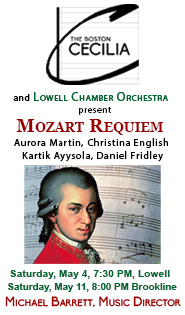Powerful Adès premiere highlights BSO’s death-haunted program

Thomas Adès leads the BSO in his “Totentanz,” featuring soloists Christianne Stotijn and Mark Stone. Photo: Hilary Scott
St. Mary’s Church in Lübeck housed a frieze by 15-century German artist Bernt Notke. Allied bombs destroyed the original in 1942, yet the image, preserved in a photograph, was both witty and macabre. People of all classes, ranging from the Pope to a helpless infant, march slowly but surely to their deaths. An anonymous text that appears alongside the frieze establishes a somber warning: “The more you gain promotion,” Death says to a Parish Clerk, “the more your life is uncertain.”
That is the setting for Thomas Adès’ Totentanz a bristling and emotional work for mezzo-soprano, baritone, and orchestra that received its Boston premiere Thursday night at Symphony Hall. Adès, beginning his three-year post as artistic partner, led the Boston Symphony Orchestra in a bold and powerful performance.
Adès, 45, stands firmly as a modern master, capable of writing music of surging power and technical brilliance. Totentanz is his most remarkable and successful work to date.
The 35-minute piece is full of vibrant instrumental colors that paint a dark and brooding canvas. Its themes grind through Stravinskian mixed meters and cross rhythms. Angular brass statements, smacks of drums, and aggressive string attacks fall like hammer strokes. Written in memory of Lutoslawski, Totentanz has some of the biting sonorities that mark the late composer’s style. Wild, free-flowing statements built to a climactic chord that releases into a fog of whistling string harmonics.
The vocal parts possess a similar robust lyricism, and the evening’s singers performed them with dramatic impact.
Mezzo-soprano Christianne Stotijn is no stranger to the work, having sung it in its U.K. and New York premieres. With a voice that ranged from darkness to light, she deftly captured the shock and surprise of each of the frieze’s characters as they plead to Death for mercy. Smooth and affecting, her voice colored the Song of the Parish Clerk with ghostly vocal slides. Mark Stone, making his BSO debut, sang with laser-like intensity and cold presence as Death. His opening lines set a sobering reminder: no one, he tells the listeners, lives forever.
In all of its cold, penetrating power, Totentanz has a few moments of warmth. When death meets a young child at piece’s close, Stotijn and Stone traded glowing phrases with a brass chorale. But it is short lived. Earthy statements from tuba and contrabassoons provide an eerie finality to it all, like dirt on a fresh grave. Through Adès’ deft and evocative guide, the dance of death stopped for no one.
The theme of death also haunts Britten’s Sinfonia da Requiem, which opened the concert. Completed in 1940 and submitted for concerts in honor of the Japanese Empire (it was ultimately not performed for those festivities), the work is one of Britten’s most colorful and affecting pieces for orchestra.
Adès, who has frequently been heralded as Britten’s heir apparent in British music, has a fine feel for the score. He is an energetic presence at the podium, leading with broad, waving gestures, scooping upbeats, and occasional punches that spotlighted every entrance and percussive hit.
The work opened with a thud. A lonely timpani sounded the death knell before a coldly lyrical theme wound its way through cello, violas, and winds. The central movement was a prickly dance of death, complete with growling brasses, from which Adès coaxed playing of bracing energy. The final movement, with its warm wind chords, offered brief glimpses of heaven.
Fine and evocative playing also marked Thursday’s performance of Sibelius’ Tapiola.
Adès conjured the opening woodwind lines with careful attention to detail and wove the piece’s dark, folk-like melodies into a soft fabric of sound. Flute figures blew like a cold breeze, and the soft sections seemed to glow at a distance. The conductor’s hammer-like gestures drew blasting chords from the brass. The only resolution came at work’s end, where a soft chord in strings and winds floated heavenward. For a brief instance, death seemed only a distant dream.
The program will be repeated 1:30 p.m. Friday and 8 p.m. Saturday at Symphony Hall. bso.org; 888-266-1200.
Posted in Performances

